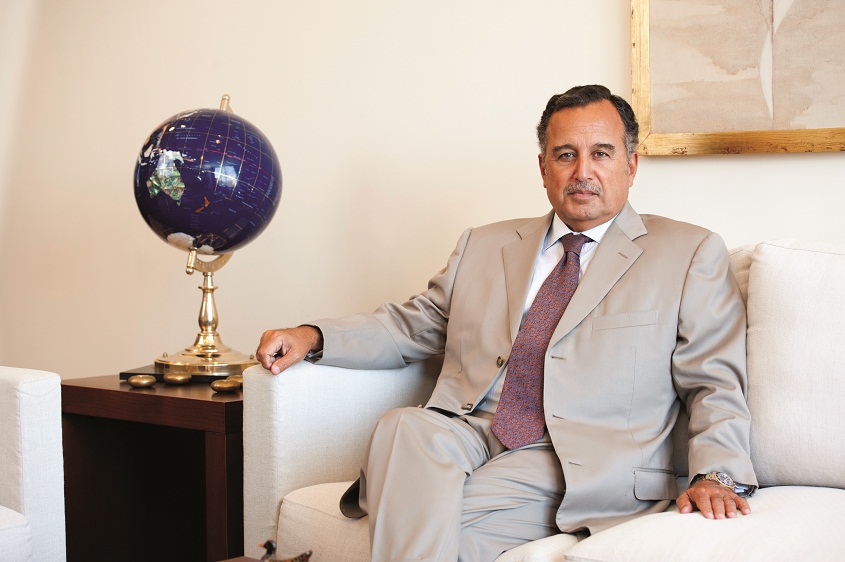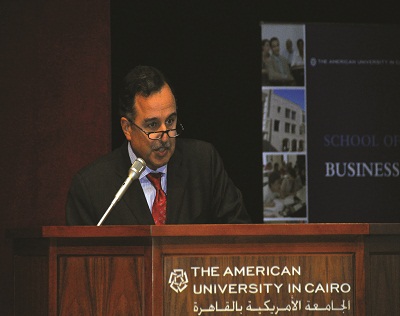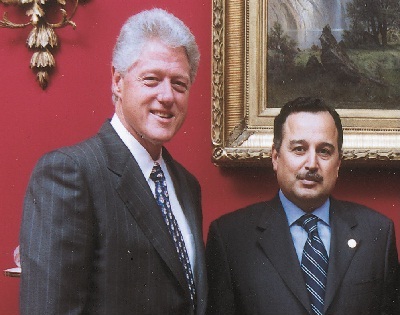|
|||||||||||||
After serving as ambassador to the United States for nine years, why did you decide to join AUC and begin an academic career? At GAPP, we educate our students about what’s happening in the world and help them develop the skills needed to promote different types of policies. We hope to provide all our graduates and trainees with skill sets and competencies that emanate from a global outlook, a multidisciplinary education, hands on practical experience, a public policy orientation, as well as communication and negotiation skills. AUC students need to see things from multiple perspectives, not just through the lens of domestic and U.S. policy. Helping them develop such a comprehensive approach to working in the public domain will ensure that they will be able to affect, advocate and have a say on public policy issues, ultimately contributing to more effective policymaking on both the local and international levels. What role will the newly launched GAPP Executive Education program play in shaping public policy in Egypt The executive education program developed by GAPP is an important opportunity the school offers to current practitioners in government, public organizations and civil society in Egypt, the region and even internationally.The program provides participants with creative tools and methods to optimally develop and implement policy decisions on numerous issues in the public domain. The courses are driven by demand from our constituencies as well as our commitment to bring forward new topics, trends, concepts and techniques that have evolved worldwide. We have a signature flagship program that we offer annually on strategic planning, open-enrollment programs that we offer with our partner institutions covering numerous topics that change from year to year, and client-driven programs that we tailor to market demand. In all cases, our offerings are inclusive, cross-disciplinary and focused on providing skill sets that have been rigorously tested and can be quickly utilized by participants. Over the past year, GAPP has initiated cooperation agreements with top public-policy institutions worldwide. We believe that institutions like AUC should remain leaders in evolving practices and partnerships that will define global education in the 21st century. Collaborating with leading academic institutions worldwide helps in fostering academic and educational interaction, which includes the exchange of graduate students, faculty members, academic materials and publications; as well as participation in seminars, conferences and workshops; development and implementation of executive training programs; and engagement in joint research projects. Through these kinds of collaborations, we can bring the latest trends to our students and enhance our capacity to influence the intellectual debate around the issues of public policy in a global context. In an era of political and economic globalism, institutions of higher learning are compelled to follow the lead of nations who are engaging in proactive diplomacy, opening borders and easing restrictions that separate people and ideas.
The school also introduced a public policy lecture series as well as a quarterly journal, The Cairo Review of Global Affairs, scheduled to debut in January 2011. How do these initiatives help in promoting dialogue about public policy issues in the region? The aim of establishing the lecture series and journal is to bring the international debate to the local On the academic front, why has the school recently split the Master of Public Policy and Administration into a public policy degree and a public administration degree? Separating the master’s in public policy and administration into two programs is a significant refinement in our academic offerings. It will provide better focus for our students and faculty, and is more consistent with international norms and standards in these domains. We are also now offering a dual degree with construction engineering, where students receive a Bachelor of Science from the School of Sciences and Engineering and a Master of Arts from GAPP in six rather than five years. What are the main opportunities that lie ahead for the school? GAPP is building on a strong foundation of departments with highquality faculty members, so we’re not starting from scratch. GAPP’s academic programs and research centers are already well-established and come with their own reputation, and that has helped a lot in establishing cooperation agreements with other educational institutions. We have the right balance of departments and research centers that offer our graduates a strong multidisciplinary academic foundation. We are a school that is still growing, and I expect to offer several new degrees in the years to come around the general subject of global affairs. Over the next few years, we will be making a number of changes in the programs offered and enhancing features that raise the quality of what the school has to offer. I look forward to continuing our work to become the premier School of Global Affairs and Public Policy in the region. Why did you join the diplomatic service, although your studies were in different fields? When I was an undergraduate, I hadn’t decided what I wanted to do, and I was reasonably good at math and physics, so I majored in these areas. That is the beauty of a liberal arts education, which opens your mind and helps you think about and enjoy different things until you find your vocation. After graduation, I was inclined to move toward business. I had no intention of joining the foreign service, especially that my father, who served as Egypt’s foreign minister for years, discouraged me from doing so because he wanted me to make it on my own and not build on his success. However, I was challenged by one of my friends to see if I could pass the foreign ministry exam. I passed, and the day I joined the foreign service, I was offered a job at an international bank that was 21 times my salary in government. I never regretted my choice. What is your advice to students who want to pursue a career in diplomacy? Diplomacy is a vocation, rather than a career. If your commitment is there, it is tremendously fulfilling. If you look at it as a job, the professional and personal challenges that come with it are daunting. To do well in light of these challenges, one must develop the right set of skills. In the public policy domain, including diplomacy, you must be able to communicate your thoughts and opinions convincingly and transform these ideas into international or domestic norms through negotiation and legislation. Whether you are advocating policy or representing your country abroad, you have tolearn to agree and disagree, without taking offense to the other side. It’s not about being nice, but about being understood, respecting your counterparts and having them respect your viewpoint. You have to learn how to think, listen and present your case rationally, and understand that the truth is not only what you see. You have to be rational, not argumentative. As my father always told me, diplomacy is not about being vague; it’s about being clear and credible. |
|||||||||||||



